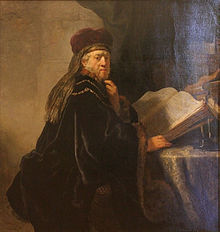History of scholarship
This article needs additional citations for verification. (August 2022) |



The history of scholarship is the historical study of
fields of study which are not covered by the English term "science" (cf., history of science), but are covered by, for example, the German term "Wissenschaft" (i.e., all kinds of academic studies). Examples are the history of classical studies, the history of the study of religions, of philosophy, of Biblical studies, of historiography, of the study of music, the study of arts, the study of literature etc. It is a field which has recently undergone a complete renewal and is now a major branch of research.[1] As of 2016, the journal History of Humanities
is dedicated to writing the history of scholarship in the humanities as different from (although interconnected with) the sciences.
Philosophers, scholars, polymaths, and scientists
The word scientist was coined by the English philosopher and historian of science William Whewell in 1833. Until then there was no differentiation between the history of science, the history of philosophy and the history of scholarship.[2][3]
Before 1700 the fields of scholarship were not of a size that made academic specialisation necessary.[Arts and Humanities.[citation needed]
See also
- Art history
- Cultural history
- Historiography
- History of archaeology
- History of books
- History of education
- History of European research universities
- History of ideas
- History of knowledge
- History of mathematics
- History of science
- History of writing
- Human science
- Intellectual history
- Medieval university
- Scholarly method
References
- ^ Ligota, C. R. & Quantin, Jean-Louis (2006). History of scholarship: a selection of papers from the Seminar on the History of Scholarship held annually at the Warburg Institute. Oxford: Oxford University Press.
- ISBN 0-226-08928-2.
- ISBN 978-0226317830.
Further reading
- Weinberg, Joanna (2006). A Sixteenth Century Hebraic Approach to the New Testament. In: History of scholarship: a selection of papers from the Seminar on the History of Scholarship held annually at the Warburg Institute, edited by Christopher Ligota and Jean-Louis Quantin. Oxford (pp. 231–250).
External links
- The Seminar on the History of Scholarship is held annually at the Warburg Institute (Oxford-Warburg Studies)
- The scholarships through scholefy scholarships all over the world through scholefy
- A.A. Donohue: History of Scholarship of Classical Art History. http://www.oxfordbibliographiesonline.com/view/document/obo-9780195389661/obo-9780195389661-0135.xml;jsessionid=276B8B6B39C868C9DBC7572473B192DF
